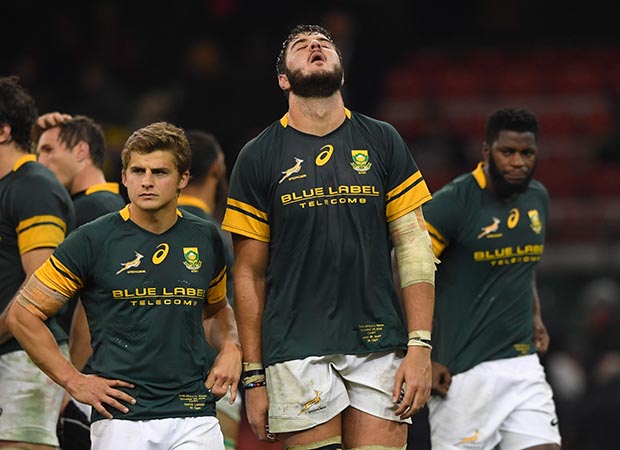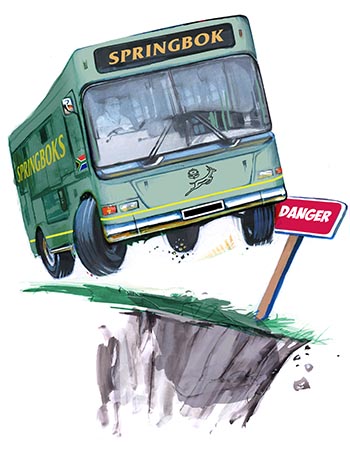 As the Six Nations gets underway there is an issue that should be uppermost in the minds of its council, and in particular its chief executive, John Feehan. It is whether the Six Nations should make the landmark decision to include another major power by offering South Africa a way into the tournament.
As the Six Nations gets underway there is an issue that should be uppermost in the minds of its council, and in particular its chief executive, John Feehan. It is whether the Six Nations should make the landmark decision to include another major power by offering South Africa a way into the tournament.
This could happen after the SANZAAR contract that ties the South Africans to New Zealand, Australia and Argentina ends in 2021 – although it would make more sense to thrash it out before 2019, when World Rugby's major schedule reshuffle is to be announced. At the same time, EPRC should examine expanding the European Cup to include the five/six top South African franchises.
The urgency is because a country which has long been considered a Rugby Union powerhouse now resembles a bus heading for the edge of a precipice, with nobody on board capable of hitting the brakes. If it does go over the cliff, the implications for the global game – and for its guardian, World Rugby – are far reaching, and potentially hugely damaging.
Not only is South Africa the main engine in spreading the game throughout the African continent, it has been second only to New Zealand at international level as the game's most successful rugby nation. World Rugby needs the competitive base in international rugby to grow rather than shrink, and the removal of South Africa as a top player is potentially disastrous for this sport.
The reality is that South African rugby is being battered from all sides. On the political front there are some within the ANC government who are not lovers of the Union code because of its associations with apartheid and Afrikaner supremacy, and they could not care less if it goes into the void.
That attitude is reflected in the political interference which has seen the SA government impose positive discrimination quotas which dictate that by the 2019 World Cup the Springbok squad is 50 per cent black or coloured.
As if those storm clouds were not enough, there is a financial hurricane ripping the South African game from its moorings. Just before his decade-long stint as South African Rugby Union president came to an end last year, O'Regan Hoskins let it be known that 420 South Africans were earning a living overseas as professional rugby players.
They are to be found mainly in France, Italy, Britain, Ireland and Japan, attracted by the massive financial incentive of salaries that are two or three times what they could earn in South Africa, in currencies that are far stronger than the Rand (currently trading at 18R to £1).
This week Edward Griffiths, the former South African RFU chief executive, who was instrumental in making the 1995 World Cup such a landmark moment for the country, put the scale of that exodus into perspective.
After a year in which the Springboks crashed and burned, enduring one of the worst run of results in their illustrious history, winning only four out of 12 Tests, Griffiths told me: “It's a miracle that South Africa are still competing at international level given the number of top players who have left the country. Just imagine if you took 300 professional players out of the English Premiership and Championship – English rugby would be devastated.”
 Griffiths, the former Saracens CEO who was a consultant to the Sharks before recently joining Worcester, added: “Where good provincial players can earn £2m Rand a year (£110,000) in South Africa, in France they can earn at least £220,000, plus a flat and a car. It's no contest.”
Griffiths, the former Saracens CEO who was a consultant to the Sharks before recently joining Worcester, added: “Where good provincial players can earn £2m Rand a year (£110,000) in South Africa, in France they can earn at least £220,000, plus a flat and a car. It's no contest.”
So far, with South African rugby in disarray at national and provincial level, the only proposal to arrest a player drain that includes leading Springboks like Toulon-based No.8, Duane Vermeulen, is an Australian-style caps ruling. Namely, that only those who have passed a c. 40-cap barrier before they join overseas clubs, can be recalled to play for South Africa.
Another significant impediment to South African rugby is that its finances – through its main broadcast partner, Supersport – are propping up the whole SANZAAR structure, including its flagship tournaments, the Rugby Championship and the Super 18.
Griffiths says: “South African rugby actually generates enough money to compete on the global stage. The Supersport deal provides 70 per cent of SANZAAR's broadcast income, but when the whole pie is divided South Africa only gets 40 per cent back. So, a South African broadcaster is one of the biggest funders of Australian and New Zealand rugby. It works very well for them, and is disastrous for South Africa.”
The cracks in SANZAAR have become wider since last year's expansion of Super Rugby to include Argentine and Japanese franchises, with widespread dissatisfaction as the second year of the experiment gets underway.
“Nobody understands the new Super 18 format, and fans are losing interest,” Griffiths says. “It is skewed, with South African teams spending half their lives on aeroplanes. There's yet more travel with Argentina and Japan included, but they do not bring much additional TV revenue. It's a tournament that has lost its way.”
Ask Griffiths if there is a serious drive in South African rugby to look towards the Six Nations for salvation, and he says that the fans want it, but the administrators are divided and unsure.
“You will find very few South Africans who back SANZAAR, and most support a North-South solution. But, although there was a wobble when they looked north two years ago, the powers that be were persuaded to stay with SANZAAR on the basis of better the devil you know…”
It is hard to understand why, given that the north-south link would unite the biggest broadcast markets in the game – England, France and South Africa – as well as generating the biggest revenue. The crucial logistics of being in the same time zone, and relatively straightforward travel schedules, are another massive improvement. Furthermore, being in the same playing window as European nations and clubs would mean more ready access to South Africa's overseas playing resources.
There is little doubt that inclusion in the Six Nations would breathe life into South African rugby. It is unfortunate that Rugby Union statesmen with vision and clarity seem to be in short supply at the moment.
However, those charged with making the big decisions in our game should be reminded that this year it is a decade since South Africa beat England in the 2007 World Cup final in Paris. They should also reflect that unless there is a serious attempt made now to arrest South Africa's slide their next win will be a very long time coming.


























